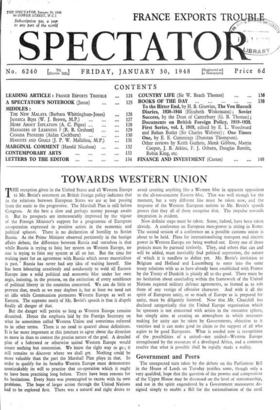TOWARDS WESTERN UNION
THE reception given in the United States and all Western Europe to Mr. Bevin's statement on British foreign policy indicates that in the relations between European States we are at last passing
from the static to the progressive. The Marshall Plan is still before Congress. At the best a slow and perhaps stormy passage awaits
it. But its prospects are immeasurably improved by the vigour of the Foreign Minister's support for a programme of European co-operation expressed in positive action in the economic and political spheres. There is no declaration of hostility to Soviet Russia. As the Prime Minister observed pertinently in the foreign affairs debate, the difference between Russia and ourselves is that while Russia is trying to foist her system on Western Europe, no one is trying to foist any system at all on her. But the time for waiting inert for an agreement with Russia which never materialises is past. • Russia has never had any idea of waiting herself. She has been labouring ceaselessly and assiduously to weld all Eastern Europe into a solid political and economic bloc under her own aegis, insisting, in the process, on the extinction of every semblance of political liberty in the countries concerned. We can do little to prevent that, much as we may deplore it, but at least we need not sit idle while Communism permeates Western Europe as well as Eastern. The supreme merit of Mr. Bevin's speech is that it dispels finally all danger of that.
But the danger will persist so long as Western Europe remains disunited. Hence the emphasis laid by the Foreign Secretary on what he sometimes called Western Union and sometimes referred to in other terms. There is no need to quarrel about definitions. It is far more important at this juncture to agree about the direction to move in than to contest the precise nature of the goal. A detailed plan of a federated or otherwise united Western Europe would create nothing but contention. We know the right way to go ; it still remains to discover where we shall get. Nothing could be more valuable than the part the Marshall Plan plays in that. In order to qualify for its benefits Western Europe must demonstrate unmistakably its will to practise that co-operation which it ought to have been practising long before. There have been reasons for its hesitations. Every State was preoccupied to excess with its own problems. The hope of larger action through the United Nations had to be explored first. There was a natural and right desire to avoid creating anything like a Western bloc in apparent opposition to the all-too-concrete Eastern bloc. That was well enough for the moment, but a very different line must be taken now, and the response of the Western European nations to Mr. Bevin's speech proves that they all of them recognise that. The impulse towards integration is evident.
Now definite steps must be taken. Some, indeed, have been taken already. A conference on European manpower is sitting in Rome. The second session of a conference on a possible customs union is about to be held. Plans for internationalising transport and electric power in Western Europe are being worked out. Every one of those projects must be pursued tirelessly. They, and others that can and will be added, must inevitably find political expression, the nature of which it is needless to define yet. Mr. Bevin's invitation to Belgium and Holland and Luxemburg to enter into the same treaty relations with us as have already been established with France by the Treaty of Dunkirk is plainly all to the good. There must be no hesitation about concluding within the framework of the United Nations regional military defence agreements, so framed as to rob them of any vestige of offensive character. And with it all the spirit of European unity, or so much of Europe as is prepared for unity, must be diligently fostered: Now that Mr. Churchill has declared categorically that the United Europe organisation which he sponsors is not concerned with action in the executive sphere, but simply aims at creating an atmosphere in which measures making for unity can be taken by Governments, objection to it vanishes and it can make good its claim to the support of all who aspire to be good Europeans. What is needed now is recognition of the possibilities of a united—not unified—Western Europe strengthened by the resources of a developed Africa, and a common resolve that what is possible shall be rapidly made a reality.


































